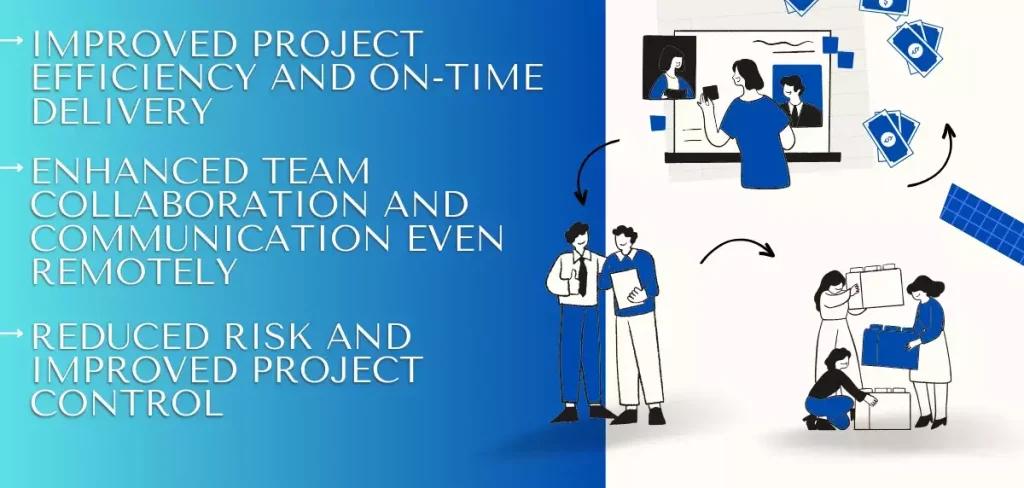Managing projects can feel like a mess of emails and spreadsheets. Project management software acts as your digital project manager, streamlining communication, boosting efficiency, and keeping everyone focused on the finish line.
The results speak for themselves: According to a 2023 study, 77% of businesses reported improved project success rates after implementing project management software. That’s a significant jump! There’s more! 86% of organizations currently struggle with real-time tracking of key performance indicators (KPIs). Project management software tackles this challenge, too, providing valuable insights to help you make data-driven decisions and optimize your projects for success.

What & Why Project Management Software?
Project management software acts like a central hub for all your project needs. These tools offer features like:
- Effortless Task Management: Break down complex projects into manageable tasks, assign them to team members, set clear deadlines, and track real-time progress.
- Seamless Collaboration: a collaborative environment with features like shared documents, discussion boards, and built-in chat tools. This keeps everyone informed and on the same page.
- Clear Communication: Ditch the email overload! Project management software provides centralized communication channels, making it easy for everyone to stay connected and share updates.
- Efficient Planning and Scheduling: Visualize your project timeline with tools like Gantt charts and calendars. This helps you stay organized, allocate resources effectively, and identify potential roadblocks before they happen.
- Time Tracking and Reporting: Track team member’s time log details on specific tasks, allowing for accurate project cost estimation and billing. Generate insightful reports to analyze project performance and identify areas for improvement.
- Budget Management: Set project budgets and track expenses in real time. Stay on top of your finances and identify potential budget overruns early on, allowing for proactive adjustments.
- Analytics and Dashboards: Gain valuable insights into project progress with customizable dashboards that provide key performance indicators (KPIs) at a glance. Track metrics like completion rates, resource utilization, and project health, empowering data-driven decision-making.
- Integrations: Connect your project management software with other essential business tools, such as communication platforms, file storage services, and marketing automation tools, to streamline workflows and boost overall productivity.
By smartly using these features, project management software plays a vital role in the business & helps teams work together well and stay organized. This makes it easier to reach project goals.
Why should Businesses use these tools?
Project management software is no longer a luxury; it’s a business necessity. This powerful tool keeps everyone organized, deadlines on track, and communication flowing. Plus, happy and productive teams lead to better results. You can make informed decisions and gain a competitive edge with real-time project insights. Project management software is invaluable in enhancing project success rates by 77% (according to a 2023 study). Ultimately, project management software equips your business with the competitive edge to deliver exceptional results and consistently achieve those ambitious goals.
Benefits of Using a Project Management Software for Your Business
Project management software empowers teams to achieve their goals and deliver exceptional results by streamlining processes, encouraging collaboration, and enhancing visibility.

1. Improved Project Efficiency and On-Time Delivery: No More Missed Deadlines!
- Effortless Task Management: Break down complex projects into manageable tasks, each with clear deadlines and assigned team members. This clarity prevents confusion and ensures everyone knows exactly what they need to do and when.
- More intelligent Scheduling: Visualize project timelines with tools like Gantt charts and calendars. Drag and drop tasks to optimize scheduling, identify potential overlaps, and ensure a smooth workflow.
- Resource Allocation Made Easy: Allocate team members based on their skills and availability. Identify potential bottlenecks early on and adjust resource allocation accordingly to keep projects on track.
- Real-Time Progress Tracking: Monitor progress in real-time, allowing you to identify delays and take corrective action before they snowball.
With these features, project management software empowers your team to work smarter, not harder, ultimately leading to better time management and consistent on-time delivery.
2. Enhanced Team Collaboration and Communication even Remotely
- Centralized Hub for Information: Project management software provides a central platform for all project-related information. Everyone has access to the latest files, discussions, and updates, ensuring everyone stays informed and on the same page, regardless of location.
- Seamless Communication Tools: Facilitate instant communication through built-in chat features, discussion boards, task comments, and video conferencing functionalities. This encourages a culture of collaboration across teams and geographical locations, eliminating communication silos and promoting a sense of team cooperation, even for remote or geographically dispersed teams.
- Task Assignment and Accountability: Assign tasks to specific team members, promoting ownership and accountability. Additionally, many platforms offer features like task checklists and subtasks, which can be further assigned to team members. This breakdown of complex tasks into smaller, actionable steps fosters a sense of accomplishment and motivates team members to stay on track. Furthermore, project management software often includes built-in notification systems that can automatically remind team members of upcoming deadlines or overdue tasks.
3. Reduced Risk and Improved Project Control
- Clear Project Scope Definition: Clearly define the project scope at the outset, outlining goals, deliverables, milestones, and limitations.
- Real-Time Progress Tracking: Monitor project progress in real time, allowing you to identify potential roadblocks and issues early on.
- Improved Project Control: With a clear understanding of project scope, progress, and potential risks, you gain greater control over the project. This empowers you to make informed decisions and adjust strategies as needed.
Use cases and Industries for which Project Management Software is Essential and Beneficial
Let’s explore how different industries can leverage project management software for success.
Marketing & Advertising Agencies:
- Campaign Management: Plan social media posts, track website development progress, assign tasks to designers and copywriters, and ensure seamless team collaboration.
- Budget Tracking and Reporting: Monitor campaign budgets with real-time expense tracking. Generate insightful reports to measure campaign performance and optimize strategies for future success.
Software Development Teams:
- Agile Methodology: Visualize workflows, track progress iteratively, and adapt to changing requirements with agility.
- Bug Tracking and Defect Management: Identify and fix bugs efficiently. Assign bug reports to specific developers, track progress, and ensure timely resolution.
Construction & Engineering Firms:
- Project Scheduling and Resource Allocation: Plan complex construction projects with Gantt charts and resource management tools. Effectively allocate resources, identify potential bottlenecks, and ensure projects stay on schedule and within budget.
- Collaboration with Subcontractors: Streamline communication and collaboration with subcontractors. Share project plans, documents, and updates through a centralized platform.
- Field Reporting and Progress Tracking: Empower field personnel to submit real-time reports directly from the construction site with photos and notes. Track project progress remotely, identify issues early on and make informed decisions.
Non-profit Organizations:
- Volunteer Management: Organize volunteer efforts efficiently. Assign tasks, track volunteer hours, and communicate project updates through a central platform. Enhance volunteer engagement and streamline project execution.
These are just a few examples, and the possibilities are endless.
Project management software is a powerful tool that can be customized to fit the specific needs of any team, regardless of industry.



